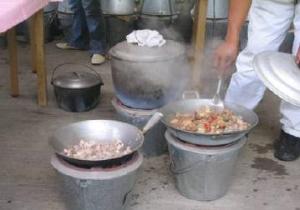
- Traditional Home Made Kitchen
Danny and Amparo Riyo own a small restaurant or carinderia in a busy residential village Quezon City – one of Metro Manila’s largest municipalities. They use a kerosene-fueled stove that releases fumes and smoke every time they cook the six dishes that they serve in their carinderia every day. The couple often have to inhale the fumes because their kitchen does not have any ventilation mechanism that would let out the gas from the stove out of their restaurant.
Salve Calimlim, a candy maker living in the same city as the Riyos, also has the same problem. Ms. Calimlim uses her home kitchen to make candies for sale and usually ends up inhaling the fumes coming from her candy making activities. This is because her kitchen is not designed to accommodate any commercial food preparation activities and does not have any mechanism to release the fumes from the stove outside her house.

Improved Kitchen Stove and Protect the Health of FMEs
The Riyos and Ms. Calimlin are only two of the over 300,000 food micro-entrepreneurs (FMEs) in Metro Manila who must face the challenge of using the least cost kitchen technology to support their food businesses while also ensuring that indoor air pollution coming from their cooking activities does not endanger their health.
Recognizing the problem faced by these FMEs, the SEA-UEMA Project and the Philippine-based Approtech Asia implemented a demonstration project that showed how an improved kitchen design can improve indoor air quality, mitigate climate change, protect the health of FMEs and reduce poverty. The improved kitchen design, which can be used in individual kitchens or in a large common kitchen for more than five FMEs, includes an energy efficient cook stove as well as clean water, lighting, sanitation and ventilation facilities. At the heart of the improved kitchen design project is an energy efficient cook stove called “Mabaga.” This stove costs P600 or roughly USD 13 each and uses inexpensive alternative fuels such as charcoal briquettes. The stove cooks faster and results in 30 to 70% reduction in cooking fuel expenses. Moreover, according to Approtech it saves approximately 1 ton of carbon if used for a year compared to using kerosene stoves.
Aside from the physical design of the kitchen, Approtech also links with micro-finance institutions to help FMEs access funds so that they can avail of the improved kitchen design. Savings generated from the reduced fuel costs have added to the FMEs capital base and encouraged them to expand their business. According to Bernadett Parado, Approtech Asia project coordinator, the expanding food business also encouraged the husbands of women FMEs to join them in the business instead of working as hired laborer far from their residence hence, enhancing family solidarity and allowing both parents raise their children at home.

Using Mabaga Charcoal Cookstove at the Local Market
Since food micro-business in the Philippines is largely a family enterprise mostly managed by women, the improved kitchen design, coupled with financing and food technology inputs have also inspired other women in the community to start food selling or expand their existing food business for additional income.
With the improved kitchen design, Danny and Amparo Riyo do not have to inhale fumes from their cooking activities and they can now handle more orders since they find it easier to make food preparations. They have also fixed the canal under their kitchen to improve wastewater and sanitation flow. On the other hand, the new kitchen design has helped Ms. Calimlim cook more candies, eliminated the fumes from cooking and helped her save money from the reduced fuel expenses.